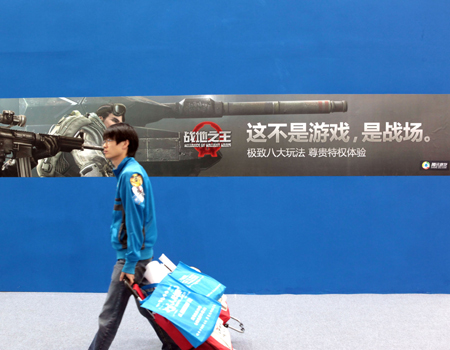Compromise in sight in Tencent-Qihoo 360 spat
|
|
|
An advertisement for a Tencent online game at an exhibition in Beijing says: "This is not a game, this is a battle." [China Daily] |
The high-profile spat between major Chinese Internet companies Tencent Holdings Ltd and Qihoo 360 showed signs of compromise on Wednesday, after the government intervened in the dispute.
Qihoo 360, China's top anti-virus software company, said on Wednesday that the two companies' products can now run on the same computers, following intervention from three government ministries including the Ministry of Industry and Information Technology.
But Liu Chang, the vice-president of Tencent, China's largest Internet company, said the two are not yet completely compatible because the company cannot accept what she alleges are "illegal acts that Qihoo 360 has made toward QQ", referring to Tencent's popular instant messaging service.
Her remarks came after Tencent, the world's third-largest Internet company by market capitalization, reported that its third-quarter profit rose 51.3 percent from a year earlier to $323.6 million.
Last week, Tencent said QQ will not run on computers with Qihoo 360's software. The tension can be traced back to September, when Tencent encouraged users to download its upgraded security product, which Qihoo 360 sees as a threat to its anti-virus software.
Tencent's QQ and Qihoo 360's anti-virus software dominate the domestic market, with more than 600 million users for QQ and 300 million users for Qihoo 360.
The unprecedented dispute between the two companies triggered dissatisfaction among many Internet users. On Tuesday, Li Yizhong, minister of industry and information technology, also criticized the companies' recent moves as "immoral and irresponsible".
The dispute between the two has been cooling down since the government began to intervene, but it has affected both companies.
Initial reports put the number of QQ users affected by the dispute as 20 million and Tencent Chairman Ma Huateng was later quoted by Reuters as saying that five million QQ users were still being affected.
It was hard to tell how much the spat might have affected Tencent's business, company President Martin Lau said at a press briefing on Wednesday.
According to a research note from Goldman Sachs Group Inc, less than 20 percent of Tencent's revenues will be affected by the spat. But if the dispute lasts for weeks, the influence will be bigger because users may leave, it said.
Jake Li, an analyst with Guotai Junan Securities, said that the dispute will not affect Tencent's business significantly.
"Compared with Qihoo 360, Tencent's loss is not that obvious," he said, adding that the market share of Qihoo 360's browser software fell from 19.9 percent on Oct 27 to 3 percent on Tuesday, according to Internet traffic tracker Cnzz.com.
But other instant messaging service providers such as Microsoft's MSN Messenger and major Chinese information portal Sina.com's Sina UC may try to grab more market share amid the dispute, he said.
MSN and Sina will hold a media conference on Thursday and the two companies are reportedly forming an instant messaging business alliance targeted at Tencent.
The Wall Street Journal reported that new user signups for MSN in China have gone "from tens of thousands normally, to millions" per day since the dispute between Tencent and Qihoo 360, citing unnamed sources.
 0
0 







